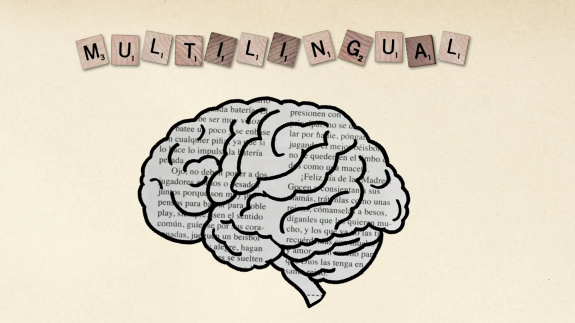
How to learn a new language: 7 tips from TED Translators
Knowing more than one language is great for your brain. But what’s the best way to learn? TED’s Open Translation Project volunteers share 7 tips:
1. Get real.
Decide on a simple, attainable goal to start with so that you don’t feel overwhelmed. German translator Judith Matz suggests: “Pick up 50 words of a language and start using them on people — and then slowly start picking up grammar.”
2. Make language-learning a lifestyle change.
Elisabeth Buffard has been teaching English for 27 years. She says that consistency is what separates the most successful students from the rest. Find a language habit that you can follow even when you’re tired, sick or madly in love.
3. Play house with the language.
The more you invite a foreign language into your daily life, the more your brain will consider it something worth remembering. “Use every opportunity to get exposed to the new language,” says Russian translator Olga Dmitrochenkova. For example, you might label objects in your house in the language, read kids’ books written in it, or watch subtitled TED-Ed Originals.
4. Let technology help you out.
Dmitrochenkova has a great idea: “A funny thing like resetting the language on your phone can help you learn new words right away,” she says. Ditto for changing the language on your browser. Or you can seek out more structured learning opportunities online. Dutch translator Els De Keyser recommends Duolinguo for its approach to grammar, and Anki for memorizing vocabulary with its “intelligent” flashcards.
5. Think about language-learning as a gateway to new experiences.
To Spanish translator Sebastián Betti, learning a language has always been about focusing on the experiences that the new language would open up, from “visiting theme parks, to enjoying cowboy poetry and folk-rock festivals, to learning about photo-essay techniques.” In other words, he thinks of fun things that he wanted to do anyway, and makes them into a language-learning opportunity. Many of our translators shared this advice. For example, Italian and French translator Anna Minoli learned English by watching undubbed versions of her favorite movies, while Croatian translator Ivan Stamenković suddenly realized he could speak English in fifth grade, after years of watching the Cartoon Network without subtitles. So the next time you need a vegan carrot cake recipe, find one in the language you’re trying to learn.
6. Make new friends.
Interacting in the new language is key — it will teach you to intuitively express your thoughts, instead of mentally translating each sentence before you say it. Find native speakers near you. Or search for foreign penpals or set up a language tandem online, where two volunteers help one another practice their respective languages.
7. Do not worry about making mistakes.
One of the most common barriers to conversing in a new language is the fear of making mistakes. But native speakers are like doting parents: any attempt from you to communicate in their language is objective proof that you are a gifted genius. They’ll appreciate your effort and even help you. Nervous about holding a conversation with a peer? Try testing your language skills with someone a little younger. “I was stoked when I was chatting with an Italian toddler and realized we had the same level of Italian,” recalls German translator Judith Matz. And be patient. The more you speak, the closer you’ll get to the elusive ideal of “native-like fluency.” And to talking to people your own age.
This article was adapted for TED-Ed from a TED Blog post. For more great articles, subscribe to the TED-Ed Newsletter.





Thought this might help with your French and me with my Spanish
Shannon I would like to help you conexionr@gmail.com
conexionr@gmail.com
My gosh.
I am a german student with turkish roots in Portugal. Now I am able to speak 4 languages. Those tips are great! Thank you guys so much.
The funny part of this Post ist number 3 with “or watch subtitled TED-Ed Originals.” I DO IT. Very funny.
I am owner of Horseed school which more than 2000 students learn at language and most of them English so tell me more.
I’m Sudanese . I enjoyed these advice about how to learn new language . These are the best 7 steps to learn new language and master it
this is useful, i agree with number 3 , i just wanna add something according to my experience, always take with you a pocket dictionary it will help a lot
thanks
Better than anki is MosaLingua…
I’m Indonesian and trying to learn English and German.
And with this post I already know what steps should I do to be better now.
(Maybe my language/grammar is bad )
)
I’m Congolese.
These advices are strong because they reassure that we have to be fearless of mistakes and interact with the same people considered of new language. Without interactions, we have no gain. Practices make perfect.
Living in a fast-paced world today, tip#4 is indeed useful. Technology can be our language helper but of course, speaking with a native speaker makes the learning fun.
Passion also plays a big role. Learning to love the language will make it fun and easier.
Tip#6 is also a good contributor. Making friends with native speakers can motivate you without too much pressure
Certainly these seven steps are basic things thar can help us learn any language and in our day by day we can’t forget . Pratice, pratice and pratice is the order of the day. Write in the objetcts its names, translate the words that you see when you are walking or in a bus. see movies in English and mainly, do friends…….
Nice article.I believe learning a language should be based on the individual’s needs.The blog is really very helpful for the any common person, who is in a need of translation. If anyone need translations service visit this website http://aussiegermantranslation.com.au/ they are best in German to English and English to German translations.
Help full tips. ..Thanks
What’s the best website to meet people to talk in different languages?
Best free websites/apps to find native speakers – language partners:
- italki
- conversationexchange
- tandem
- hello talk
Enjoy
As they say, “A little mistake is not a mistake.” So, to converse with mistakes is better than keeping silent. Thank you.
Awesome tips! I like the fourth and sixth tip. For the fourth tip, Since most people today use their phones all day, changing your default language on your phone will surely help you learn the language you’ve wanted. And as for the sixth tip, putting what you have learned into practice will also help you improve your language.
For years my business has been hiring a language translator to help us with our website content and promotional materials. Just by reading these tips, I can’t imagine the challenges they overcame to be professionals in this trade. That’s why I highly admire people who are proficient in a number of languages since it is not easy to learn even one.
What you have mentioned will help me to improve English language in the near future.
Does anyone have tips for learning ASL? I’m teaching myself at the moment with no tutor so I can graduate on time